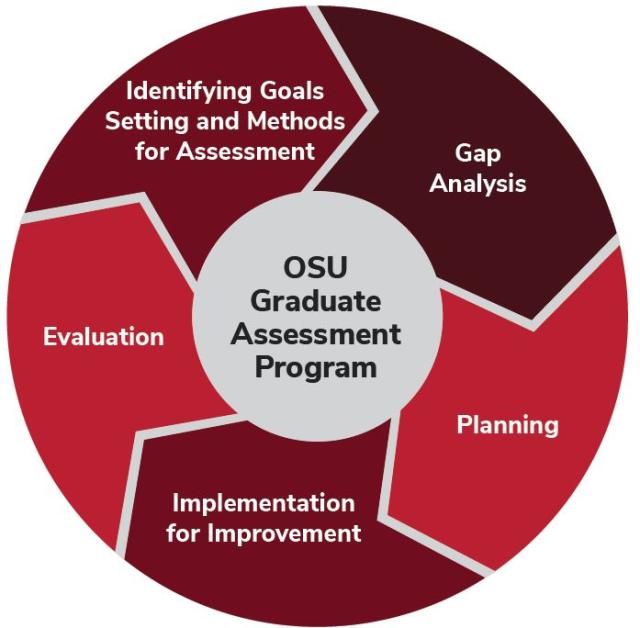Ongoing assessment of graduate programs is vital to providing high quality graduate education. Ohio State leaders in graduate assessment have shown that ongoing program assessment that builds on strengths and addresses weaknesses can lead to exciting changes for students and other program stakeholders, and provide important data for accreditation reports and program reviews.
As part of its role in supporting academic excellence, the Graduate School collects and reports on graduate program assessment activity and shares this information with the greater university community through annual reports and presentations. For a copy of the most recent report contact grad-schoolcurriculum@osu.edu
OSU offers multiple data platforms that provide information on the success of our graduate students and programs. These platforms can be found on the Data and Assessment page within the faculty and staff portal.
For more information on Graduate Education Assessment, see information and links in the boxes below:
Getting Started with the Assessment Framework

Identifying Goals and Methods for Assessment
What do you want students to learn and how will you measure that learning?
What are the goals and benchmarks students should be meeting during their program?
What kinds of assessments are in place to determine how well students are meeting these goals?
What assessment activities are in place to determine how well the program is meetings its goals for students?
Gap Analysis
What does your data tell you about how well programs are meeting their goals? What gaps exist between program goals and actual outcomes?
What opportunities for growth, revision, or improvements in program offerings and implementation come from these gaps?
Planning
Planning for program improvement requires the analysis, interpretation, and sharing of data and evidence to continue to evaluate and set new goals and objectives based on what works and what does not. Consider:
What kinds of revisions, additions, or other changes might you make to your program to close the gaps you’ve identified and build on the strengths of your program?
Implementation for Improvement
Implementing plans for improvement requires attention to the people, resources, logistics, and many programmatic elements. Part of implementing new plans is an ongoing evaluation of student learning, cycling back to understanding both what we want students to learn and what and how they are learning.
How will you move forward with your program changes?
How will you address the needs of faculty, staff, and students in the change process?
Evaluation
Evaluating new initiatives and continuing evaluation of program effectiveness and outcomes is important to maintaining academic, scholarly, and operational excellence for individual programs and the university’s training mission. Evaluation results should inform subsequent rounds of goal setting, as the cycle of assessment continues. Consider asking:
How did the changes we made to the program affect student learning?
How did the changes we made to the program affect program outcomes?
What lessons did we learn in making these changes?
What does our evaluation of these changes suggest for moving forward?
Nuventive Assessment Tool
One tool Ohio State uses for program assessment is Nuventive Improve! Nuventive Improve allows programs to monitor and keep track of their progress on goals, revisions to programs, student outcomes, etc. It also serves as a depository for program documents.
To access Ohio State’s Nuventive Improve site, write to: TJ Carpenter - Grad School Admin Coordinator
Current Training Opportunities
Assessment References and Resources
Ewell, P. T. (2009). Assessment, accountability, and improvement: Revisiting the tension. (Occasional Paper No. 1). Urbana, IL: University of Illinois and Indiana University,
National Institute for Learning Outcomes Assessment.
Hersh, R. H., & Keeling, R. P. (2013). Changing institutional culture to promote assessment of higher learning. (Occasional Paper No. 17). Urbana, IL: University of Illinois and Indiana University, National Institute for Learning Outcomes Assessment (NILOA).
Jankowski, N. A., Timmer, J. D., Kinzie, J., & Kuh, G. D. (2018). Assessment that matters: Trending toward practices that document authentic student learning. Urbana, IL: University of Illinois
and Indiana University, National Institute for Learning Outcomes Assessment (NILOA).
Jankowski, N. A. and Bheda, D. (2022). Pandemic insights to shape a better future: Assessment for teaching, learning, equity, and student success. ExamSoft.
National Institute for Learning Outcomes Assessment (2016). Higher education quality: Why documenting learning matters. Urbana, IL: University of Illinois and Indiana University.
National Institute for Learning Outcomes Assessment (2020). Planning for effective communication of assessment: A toolkit for practice. Urbana, IL: University of Illinois and Indiana
University.